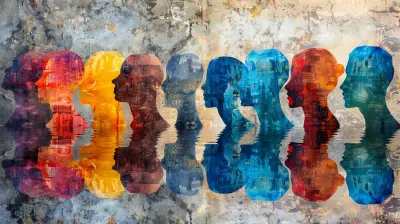Healing Through Understanding: How Psychoanalysis Helps Us Know Ourselves Better
15 June 2025
Ever felt like you’re acting a certain way and can’t quite figure out why? Maybe you lash out during arguments, or perhaps you repeat the same unhealthy relationship patterns over and over again. It’s frustrating, right? Well, that’s where psychoanalysis steps in — like a gentle flashlight shining into the dim corners of our unconscious minds.
Psychoanalysis isn’t just a fancy term from a college textbook or an outdated practice from the early 1900s. It’s a powerful and ongoing method of self-exploration that continues to help people across the globe heal emotional wounds and get to know themselves on a much deeper level.
Let’s take this journey together to see how psychoanalysis can be the key to unlocking a healthier, more self-aware version of yourself.
What Is Psychoanalysis, Really?
Okay, before we get into the juicy benefits, let’s clear up what psychoanalysis actually is.At its core, psychoanalysis is a form of talk therapy that dives deep — and we mean deep — into the unconscious mind. Think of it like archaeology for your psyche. Instead of brushing off ancient artifacts, you’re uncovering suppressed emotions, childhood experiences, and mental patterns that influence your current behavior.
This method was pioneered by Sigmund Freud. Yeah, that name probably rings a bell. But don’t worry, while his ideas laid the foundation, modern psychoanalysis has evolved over time and is far more nuanced now.
Unlike surface-level advice or quick fixes, psychoanalysis helps you slow down and really get to the root of the issue.
Understanding the Unconscious Mind
Ever had a dream so bizarre that you woke up thinking, “What the heck was that about?” Or maybe you find yourself reacting emotionally to certain situations but can’t explain why?Welcome to your unconscious mind — the hidden realm where suppressed memories, unresolved conflicts, and forgotten fears quietly influence your daily life.
Psychoanalysis aims to bring these hidden forces into the light. Once you become aware of them, you're better equipped to deal with them. It’s like discovering the blueprint for your emotional responses.
How Does Psychoanalysis Actually Work?
Let’s break it down.In psychoanalysis, sessions usually take place multiple times a week. You’re encouraged to talk freely about whatever comes to mind — no filters, no censors.
Sounds weird? A little! But that’s part of its genius. The idea is that by not holding back, you’ll naturally drift into topics that reveal your innermost thoughts and unresolved conflicts.
Here are some key techniques used in psychoanalysis:
1. Free Association
This is where you just let your thoughts flow. No structure, no direction. Therapists listen closely and pick up on recurring themes or contradictions that might hint at deeper issues.2. Dream Analysis
Freud famously called dreams the “royal road to the unconscious.” Analyzing dreams can reveal hidden fears, desires, or unresolved conflicts.3. Transference
Ever felt like you're treating your therapist like a parent or an ex-partner? That’s transference. And guess what? Recognizing these reactions helps you understand how you relate to people in your daily life.4. Resistance
When you avoid certain topics or “forget” appointments, that’s resistance. It’s your unconscious mind throwing up a defense. Spotting this helps you realize what you might be avoiding, and why.
Why Understanding Leads To Healing
It might seem a little abstract — how can just “understanding” something help you feel better?Well, let’s use a metaphor. Imagine you’re trying to fix a car that keeps stalling. You can keep filling the gas tank, but until you look under the hood and figure out what’s really going on, the problem won’t go away.
Psychoanalysis works the same way. By understanding what’s happening underneath your emotional surface, you’re better able to manage your reactions, make healthier choices, and ultimately, heal.
It’s not about fixing what’s “broken” — it’s about understanding what shaped you. That shift in perspective can be incredibly liberating.
Common Issues Psychoanalysis Can Help With
You might be wondering — is psychoanalysis just for someone dealing with mental illness?Not at all.
While it’s true that it can be incredibly helpful for conditions like depression or anxiety, psychoanalysis can also be a game-changer if:
- You struggle with low self-esteem
- You keep sabotaging your relationships
- You feel stuck, emotionally or creatively
- You're haunted by past traumas
- You experience overwhelming emotions with no clear cause
Basically, if you’re human and you want to understand yourself better, psychoanalysis has something to offer.
The Long-Term Benefits of Knowing Yourself
Let’s be honest — psychoanalysis isn’t a quick fix. It takes time, commitment, and emotional effort. But the long-term payoffs? They’re so worth it.1. Better Relationships
When you understand your emotional triggers and patterns, it naturally improves how you connect with others. You’re less reactive, more empathetic, and more present.2. Emotional Resilience
Life throws curveballs. But when you know yourself well, you build a kind of inner armor — not the kind that blocks emotions, but the kind that helps you handle them with grace.3. Improved Decision-Making
When you're not ruled by unconscious fears or past traumas, you make choices that are aligned with your true self.4. Greater Creativity and Productivity
Believe it or not, emotional blocks can affect your creative and work life too. By clearing out mental clutter, you make room for new ideas and smooth energy flow.Is Psychoanalysis Right for You?
Great question.Psychoanalysis isn’t for everyone. If you’re looking for fast solutions or symptom-based treatment, you might find therapies like CBT (Cognitive Behavioral Therapy) more helpful in the short term.
But if you’re the kind of person who loves deep dives, wants to understand the why behind your patterns, and is open to exploring your inner world — psychoanalysis could be incredibly rewarding.
Here are a few signs it might be right for you:
- You find yourself repeating the same mistakes, even when you "know better"
- You have persistent feelings of guilt, shame, or emptiness
- You’re curious about your past and how it impacts your present
- You're ready to commit to long-term self-exploration and growth
The Human Connection: Therapist-Client Relationship
One of the often-overlooked aspects of psychoanalysis is the unique relationship that forms between the therapist and the client.This bond serves as a mirror, revealing how you relate to others in your life. It’s not just “talking to a professional” — it’s building a relationship based on trust, vulnerability, and openness.
And guess what? That, in itself, is incredibly healing.
Busting Myths About Psychoanalysis
Let’s clear up a few misconceptions while we’re at it.“It’s all about blaming your parents.”
Nope. While early life experiences are explored, the goal isn’t to assign blame but to understand. It’s about context, not condemnation.“It’s too old-fashioned.”
Modern psychoanalysis has evolved a lot since Freud’s couch days. Today, it’s more inclusive, empathetic, and rooted in current psychological research.“It takes forever.”
Yes, it can be long-term, but healing doesn’t wait until the “final session.” Many people start feeling shifts and gaining insight within the first few months.Final Thoughts: Self-Knowledge Is Empowerment
At the end of the day, psychoanalysis is really about one thing: self-knowledge.And when you truly know yourself — not just on the surface, but deep down — that’s when the real healing begins.
You become less reactive, more intentional. You stop running from your past and start learning from it. You make peace with your inner critic. And most importantly, you gain the freedom to be your most authentic self.
So, if you're facing emotional challenges or even just feeling a little lost, consider taking that brave step into the world of psychoanalysis. It might just be the most enlightening journey you ever take — one that doesn’t change who you are, but helps you finally understand why you are.
all images in this post were generated using AI tools
Category:
PsychoanalysisAuthor:

Janet Conrad
Discussion
rate this article
2 comments
Xylo Hahn
Who knew diving into our own minds could be more revealing than scrolling through social media? Cheers to unpacking our brain baggage—just don't forget to check for any deep-seated snack cravings!
June 18, 2025 at 4:51 PM

Janet Conrad
Absolutely! Exploring our minds offers profound insights, often revealing more than social media ever could. Let's embrace that journey, snacks included!
Vienna James
This article beautifully highlights the transformative power of psychoanalysis in self-discovery. Understanding our inner workings fosters growth and healing. Your insights are valuable and encourage readers to embrace the process of exploration. Thank you for sharing such an enlightening perspective!
June 15, 2025 at 2:27 PM

Janet Conrad
Thank you for your kind words! I’m glad you found the insights on psychoanalysis valuable for self-discovery and healing.


